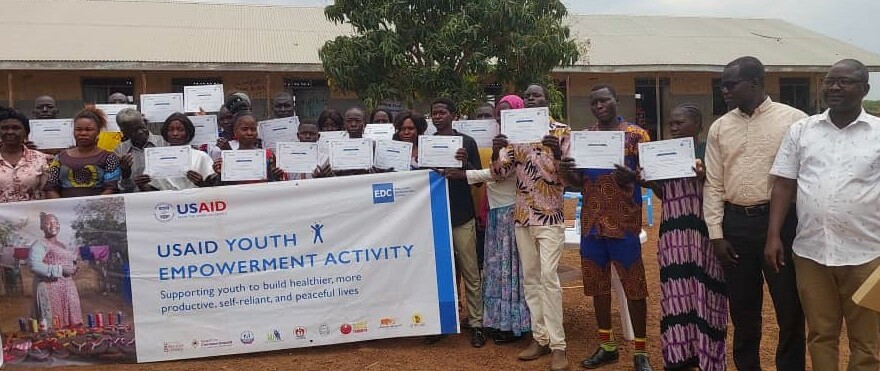As part of USAID’s efforts to enhance capacity building and livelihood resilience, implemented by the Education Development Center (EDC), a total of 345 youths from Jur River and Wau counties in Wau underwent various skill-building courses over the past six months.
Last week, the organization celebrated the graduation of 107 youths, comprising 57 females and 50 males. The remaining 238 youths are set to graduate next week. These graduates completed six months of intensive training aimed at enhancing basic numeracy, literacy, and entrepreneurial skills to empower them to lead healthier, more productive, and peaceful lives.
The graduates, aged between 15 and 29 from Wau and Jur River counties, expressed gratitude for the skills acquired during the training in an interview with Radio Tamazuj. They emphasized how these skills would positively impact their lives and contribute to business development in their communities.
One of the participants, Veronica Francis, highlighted the valuable knowledge and skills gained during the training, particularly in business management and effective communication with customers. Veronica also emphasized the leadership communication skills acquired, expressing her willingness to share this knowledge with others.
“They provided us with training on leadership, communication, and how to effectively interact with customers in the workplace,” Veronica explained. However, despite acquiring knowledge, she stressed the need for financial support to kickstart their businesses.
“We require support in various forms. While the training provided us with knowledge, we also need financial assistance to initiate our businesses. It’s perplexing to receive certificates without any tangible support to help us launch our ventures,” Francis questioned USAID and EDC.
Another beneficiary, Nyibol Lual, shared her experience and learnings from the intensive six-month training. “My name is Nyibol Lual, and I participated in the program at the Nazareth center. Over the past six months, we have undergone comprehensive training focused on various aspects of business,” Nyibol explained.
“We learned essential steps, such as starting as employees, working for others until we earn enough to establish our own shops and become self-employed,” she elaborated.
Nyibol also highlighted the valuable skills acquired in dealing with difficult and aggressive customers. “We were taught the importance of honesty in customer interactions. Despite encountering rude and disrespectful customers, we learned how to maintain integrity and professionalism,” she added.
Additionally, Radio Tamazuj interviewed two trainers responsible for the beneficiaries’ training. Flora John, a volunteer at Hai Jebel, expressed satisfaction with the progress made since the program’s inception in July 2023. “We have been training participants in Hai Jebel since July last year until February 2024, empowering them with the skills necessary to become independent business owners,” Flora stated.
Flora acknowledged the challenges faced during the training, particularly regarding participants with limited education backgrounds. However, she emphasized their success in overcoming these obstacles, noting that even those who were previously unable to read and write have made significant progress.
Meanwhile, Zackariah Makuic Makuic encouraged the participants to apply the knowledge gained over the past six months in practical settings. He also urged the funding organization, USAID, to provide financial support to help participants establish businesses that can benefit the entire country.
“I urge the participants to utilize the knowledge they have acquired and make a positive impact on their communities and families,” Makuic emphasized. “I extend my gratitude to USAID for their efforts in youth empowerment. I call upon USAID and EDC to continue their support by providing capital to help participants put their newfound skills into practice,” he concluded.
In a press statement provided to Radio Tamazuj by USAID regarding the graduation, the organization urged the government of South Sudan to utilize public resources to address the needs of the public.
“As we celebrate this milestone and acknowledge South Sudan’s future leaders, we reiterate our call on the Revitalized Transitional Government of National Unity to allocate public resources to fulfill public needs, including basic education. It is crucial for the transitional government to invest in the youth, both female and male, considering that approximately 84 percent of females over the age of 15 are illiterate, with only 8 percent enrolled in secondary school,” the statement read.
USAID highlighted its collaborative efforts with local partners on the Youth Empowerment Activity, aimed at enhancing skills, expanding livelihood opportunities, promoting positive behaviour change, and fostering social cohesion among youth in South Sudan, thus reducing their susceptibility to joining armed groups.
The program aims to graduate thousands more youth in Eastern Equatoria, Jonglei, Unity, Upper Nile, and Central Equatoria States within the year 2024.
The Education Development Center (EDC) is a global nonprofit organization dedicated to implementing lasting solutions to improve education, enhance reproductive health, and expand economic opportunities.
EDC designs, implements, and evaluates programs worldwide to enhance education, health, and economic prospects. In South Sudan specifically, EDC focuses on providing capacity building to thousands of young individuals, fostering their livelihood resilience.
Last year, EDC initiated a program targeting 25,000 youths to enhance literacy and numeracy skills by offering classes in various locations, including payams, bomas, and educational centers, thus ensuring access to education for those who have been previously marginalized.
In January of this year, EDC, with support from USAID, provided in-kind grants to seventeen youth empowerment organizations, which included items such as 200 plastic chairs, tables, solar panels with batteries, plastic sheets, laptop computers, and more, with a total value of $170,000.
Additionally, in March 2023, the United States Agency for International Development (USAID) Mission Director for South Sudan, Kate Crawford, launched a four-year, $43.5 million initiative called the Youth Empowerment Activity in Wau, Western Bahr el Ghazal State.
During the launch, USAID Mission Director Crawford emphasized that the Youth Empowerment Activity would equip youth, including girls and young women, with the knowledge and skills necessary to lead healthy, engaged, and productive lives.




